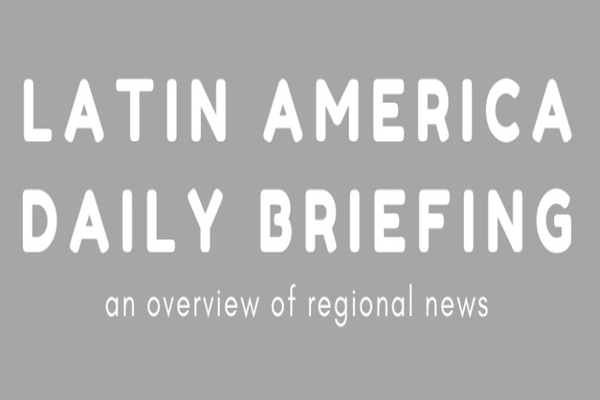
News Briefs
Venezuela
- Venezuelan Indigenous leader Virgilio Trujillo Arana, who led community defense from criminal groups and illegal mining, was gunned down in broad daylight last week. His killing has been perceived by human rights defenders as an attack not just on one individual, but against an entire community and its efforts to protect a way of life, reports the Guardian.
- Venezuelan authorities say they are investigating the killing, and hypothesize that he was killed by one of the the ilegal armed groups in the Amazonas state area that smuggle gold, drugs and other contraband along the porous border with Colombia, reports the Associated Press.
Haiti
- A year after President Jovenel Moïse was assassinated, the public is no closer to knowing who masterminded the attack or fired the fatal shots, reports the Miami Herald. A closely-guarded U.S. investigation appears to be building a murder conspiracy case that could link suspects in South Florida to Haitian perpetrators. (See yesterday’s post.)
- Violent crime in Haiti has residents of Port-au-Prince living forms of security quarantines, in which running basic errands can be a fraught endeavor, reports the Miami Herald. Kidnappings and intentional homicides, according to the United Nations’ Haiti office, have risen by 36% and 17% respectively, compared with the last five months of 2021. In May alone, the Haitian National Police reported 200 kidnappings, an average of almost 7 cases per day.
- Haiti’s Customs Agency seized an extremely large quantity of illegally imported ammunition, last week, the same day that its director was replaced on suspicion of arms trafficking. The case highlights the Caribbean nation’s struggle in combating weapons flows, according to InSight Crime.
Cuba
- A year after major anti-government protests shook Cuba, Cubans are still waiting for change, writes William LeoGrande in the Nation. Government crackdowns demoralized protest organizers, and “demands for political reform, delivered by young, middle-class professionals, did not speak to the most
urgent issue for the majority of Cubans: their deteriorating standard of living.”|
Mexico
- Mexican prosecutors are investigating former president Enrique Peña Nieto in a case involving the suspicious movements of millions of dollars, the first announcement of a corruption probe against him, reports the Washington Post.
- The brazen murders of two Jesuit priests highlights growing violence in rural Mexico and the risks Catholic priests face in their day-to-day, reports the Guardian.
- Mexican President Andrés Manuel López Obrador’s energy policies are making contamination worse, in addition to conflicting with the current geopolitical environment, global environmental standards and the country’s trade agreement with the United States, writes James Bosworth in World Politics Review.
Brazil
- Deforestation in Brazil’s Amazon rainforest reached a record high for the first six months of the year: 3,988 square km were cleared in the region, according to preliminary data from national space research agency Inpe. (Reuters)
- U.N. experts called on the Brazil’s government to adopt wide-ranging reforms to put an end to police violence, de-militarize all law enforcement agencies and vigorously address systemic racism and racial discrimination. The call comes after a police operative in Rio de Janeiro’s Favela Cruzeiro killed at least 23 people. (OHCHR)
- A British court of appeal judgment will permit more than 200,000 victims of the Mariana dam collapse in 2015 to carry out a lawsuit against mining company BHP. The case is the largest group claim in English legal history, reports the Guardian.
- Brazilian President Jair Bolsonaro’s support among women is particularly low, a marked difference from the 2018 election, reports the Associated Press.
- Work in Brazil’s meat plants may be hazardous for pregnant workers, say health experts who found that excess risk of maternal disorders for the pig and poultry sectors was at least twice as high compared with all other Brazilian employment sectors. (Guardian)
Chile
- Chile’s draft constitution includes some major reforms, like the elimination of the Senate in favor of a “Chamber of Regions” and decentralization of political power in favor of regions, communes and Indigenous territories. Americas Quarterly looks at several key aspects of the proposed constitution.
Argentina
- Speculation abounds that Argentina’s new economy minister, Silvina Batakis, will aim to renegotiate the March IMF deal in the coming months and that the Argentine peso may be headed for a devaluation, according to the Latin America Brief. (See Monday’s post.)
Regional Relations
- Argentina’s government said it had received China’s formal support for the country’s bid to join the BRICS group comprising Brazil, Russia, India, China and South Africa, reports Reuters.
Regional
- “Tusi,” a pink synthetic drug powder, also known “pink cocaine,” is expanding into new countries in Latin America and increasing its share of the region’s flourishing synthetic drug markets. Also known as “pink cocaine,” it is not a single substance, but rather a narcotic name brand, reports InSight Crime.
Jordana Timerman/Latin America Daily Briefing
http://latinamericadailybriefing.blogspot












